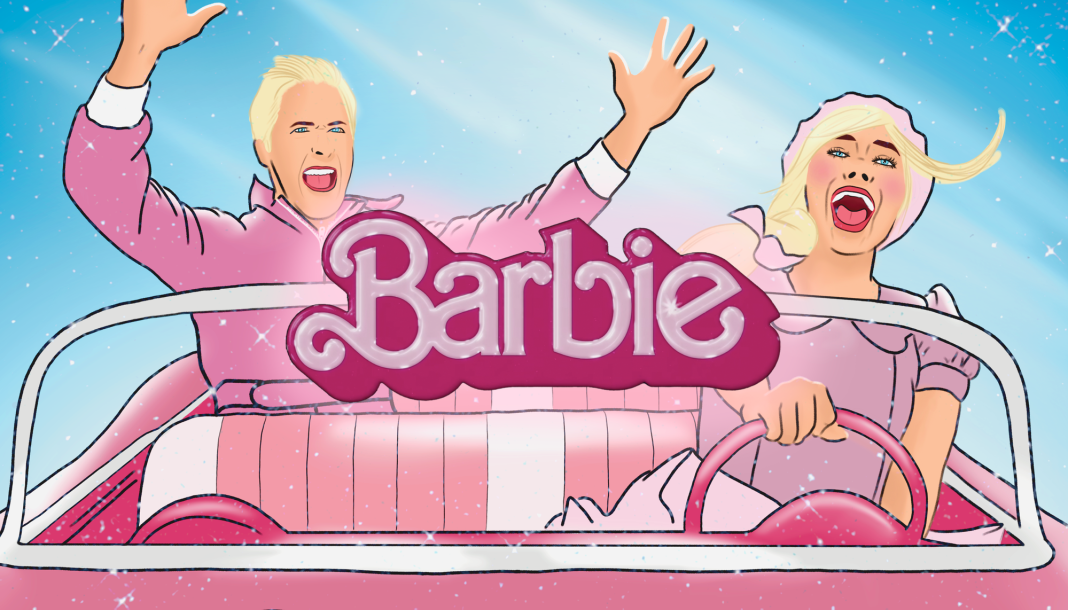
This summer is shaping up to be one filled with neon pink, satirical humor and childhood nostalgia. The highly-anticipated, live-action “Barbie” movie hits theaters on July 21.
The “Barbie” trailer has garnered 19 million views in under three weeks, a testament to the brand’s power. Though secretive about the movie’s plot, it pokes fun at Barbie and embraces the doll’s ultra feminine characteristics.
“The trailer has me super excited. I love Ryan Gosling and I think that the plot looks super exciting and unexpected,” said Thalia Vlahos, a sophomore advertising management major.
Since the trailer dropped, fans have started posting memes and parodies of the Barbie doll, including inserting themselves in the “Barbie” movie poster and mimicking the dialogue, especially the part where Ken gets mad at Barbie for not acknowledging him.
This film adds to an unnerving, emerging trend in film seen in recent releases like “Air” and “Super Mario Bros,” which sell a product along with the film. It seems that the only way to make a film outside of an established franchise is to get a company’s backing.
Films like this largely contribute to a capitalistic film industry, one meant to represent the creativity and freedom of expression revolutionized by independent filmmakers in the 70s like Stanley Kubrick and Steven Spielberg.
The “Barbie” film, though associated with the Barbie brand, seems self-aware of this capitalist trend within the film industry. Its director — Greta Gerwig — is the ideal person to tactfully navigate this profit-driven landscape.
One of the most notable female directors in recent history, “Barbie” is Gerwig’s first big blockbuster. Gerwig’s resume includes films like “Little Women” and “Lady Bird,” both widely-acclaimed for their depictions of adolescence and the female experience.
Known for her feminist perspective, Gerwig’s take on Barbie might be thought-provoking enough to criticize its source material and shift the current image of the doll.
“I was a big fan of ‘Barbie Fairytopia’ as a kid and it’s great to see a more mature take on it,” senior motion pictures major Catherine Woods said.
With an array of animated movies and stores around the world, Barbie has become a global phenomenon. In 200, Barbie sales brought in a whopping $1.49 billion, contributing highly to the power and influence that Mattel, the global toy company that manufactures Barbie dolls, holds as a corporation.
The Barbie doll has also been an icon of femininity, a staple of a young girl’s toy collection with her long legs and blonde hair. Though Barbie is known for representing femininity, she’s also contributed to the hypersexualization that young women face.
Some studies have linked Barbie to a culture among young girls that promotes thinness and height as indicators of attractiveness. One 2016 study published in the peer-reviewed journal “Body Image” found that exposure to Barbie led to higher internalization of the thin ideal among girls between five and eight years old.
Barbie was originally modeled and based after a German novelty doll called Bild Lilli. Mainly purchased by men, the doll’s accompanying comic strip featured a sexually explicit Lilli and a variety of lewd phrases meant to satisfy men.
That doll, though different from the current Barbie, is still tied to her identity as a beautiful, sexy toy. The upcoming “Barbie” movie has the potential to reimagine the doll’s image.
Barbie can be anything: Doctor, lawyer, princess and now, maybe feminist icon. Until July 21 comes around, we’ll just have to wait and see.






